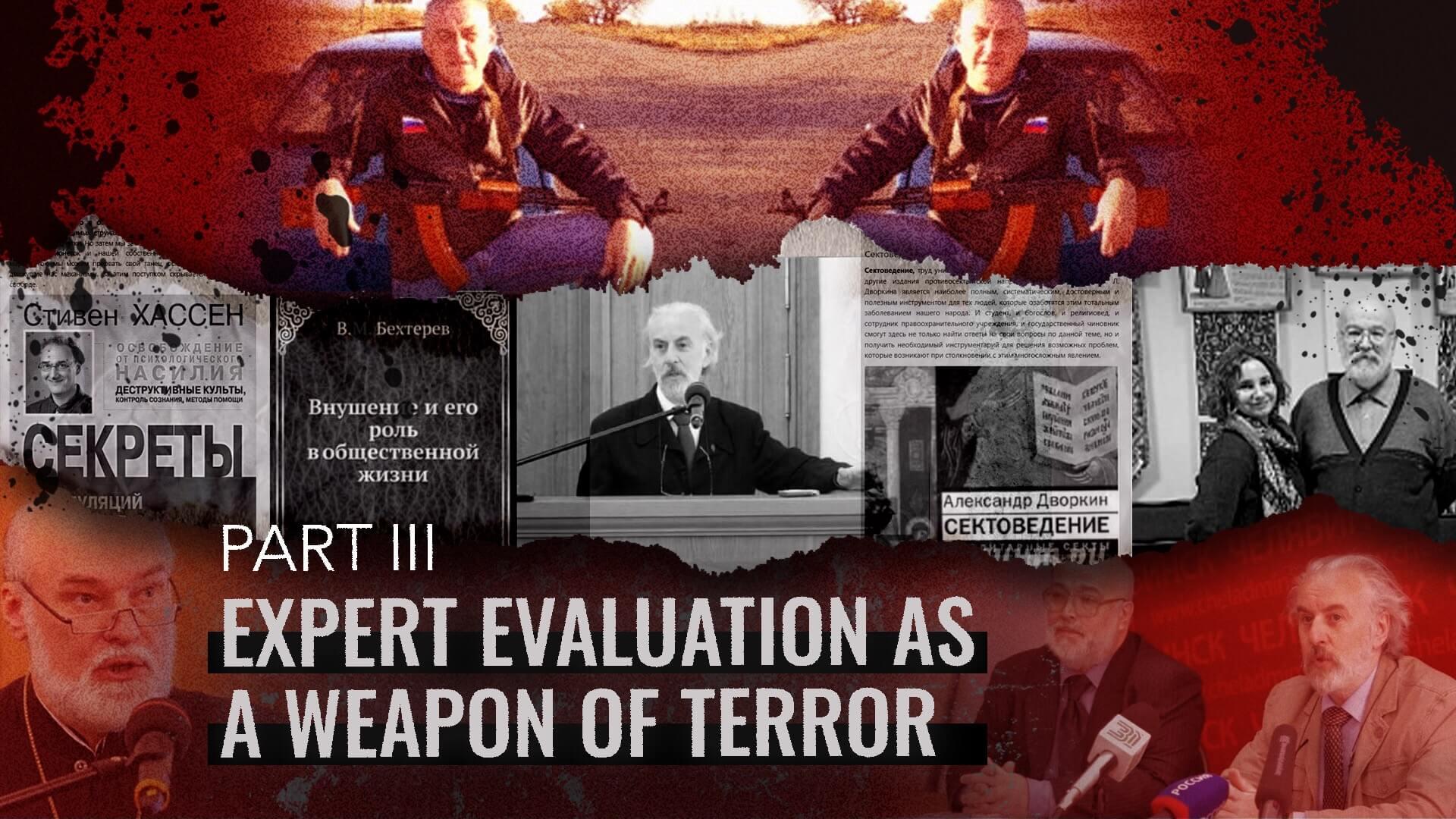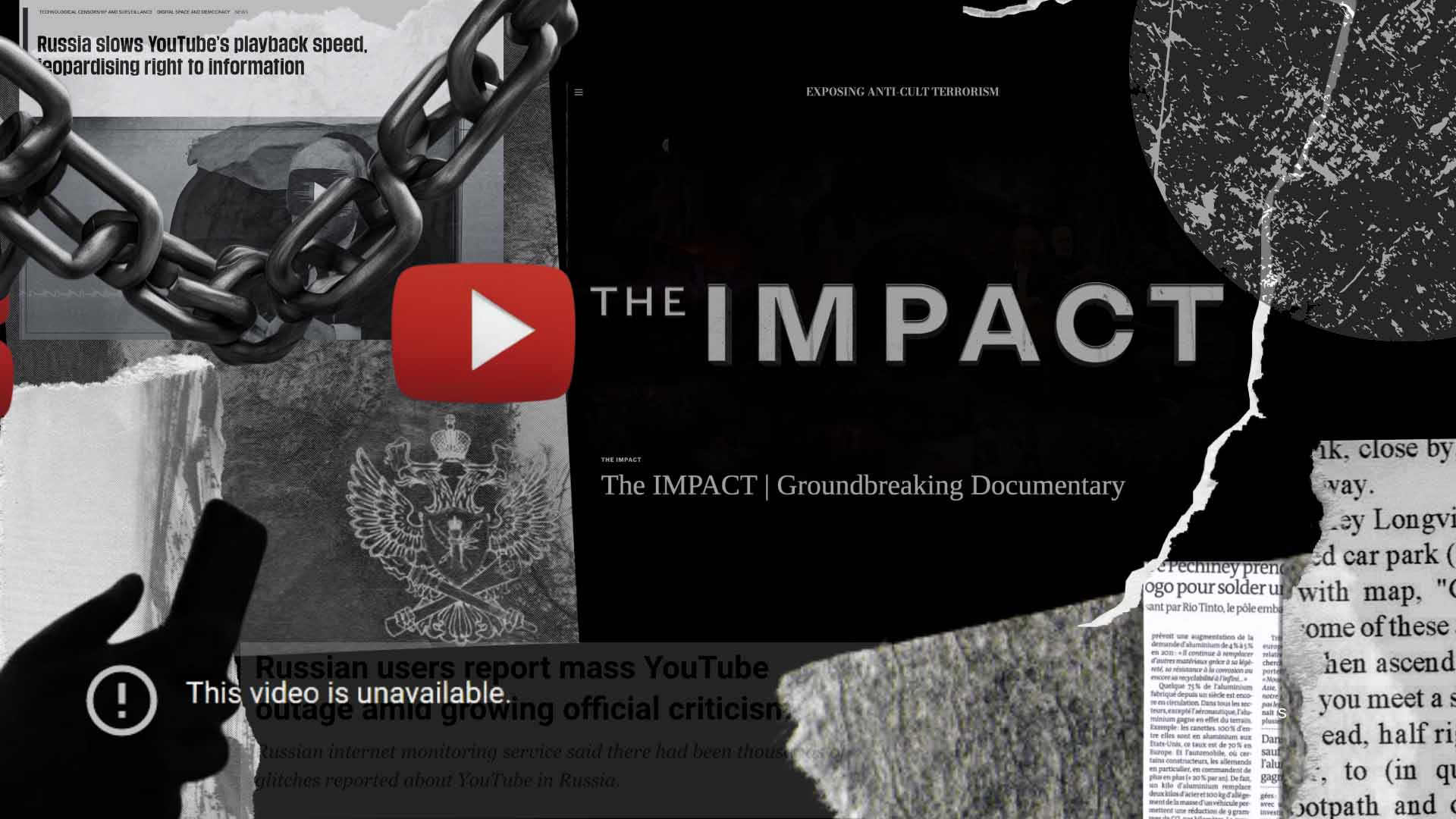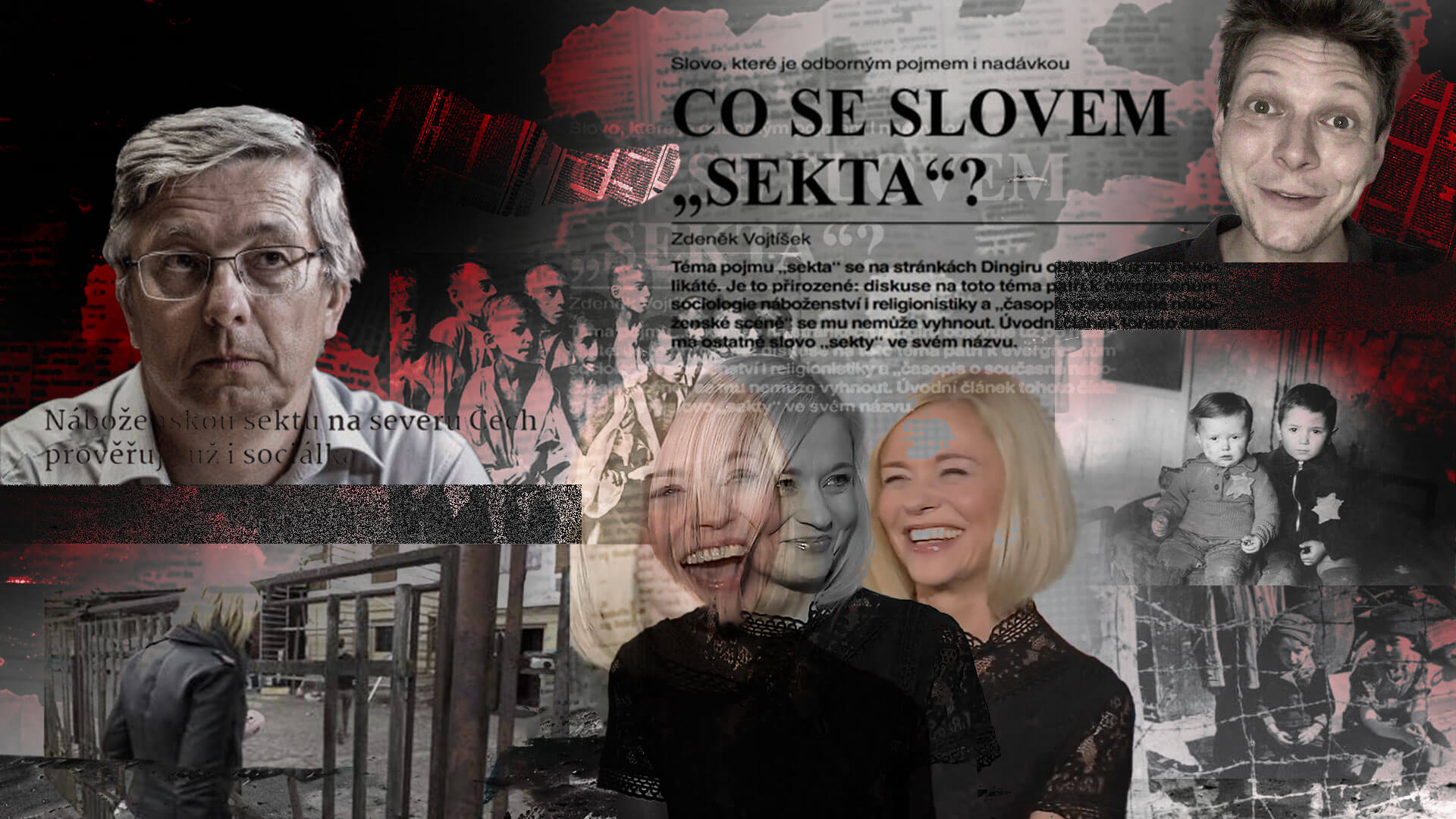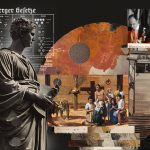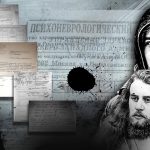In this article, we will analyze in detail how legislative loopholes, institutional deformations, and personal involvement of specific actors have turned expert evaluations into a key tool used by the extremist and terrorist sect RACIRS and its leader, Alexander Dvorkin. We will expose the schemes used to produce “repressive expert reports.” We will show how the legal institution of justice, designed to uphold the truth, ensure legality, and strengthen the rule of law, has been used by Alexander Dvorkin to incite hostility and hatred among the population, and to launch a mechanism of government repression and destruction.
In the previous series of articles, our analysis didn’t just focus on the notorious Tomsk trial over the book “Bhagavad Gita As It Is,” as described in detail on actfiles.org in the article “Expert Evaluation as a Weapon of Terror”. We also carried out a detailed examination of the roots of modern Nazism, reflected in Alexander Dvorkin’s activities (article “Expert Evaluation as a Weapon of Terror. Part II. The Zero Patient of Modern Nazism”). In this article, we will consider a broader context: the legal, methodological, and personnel prerequisites that made it possible to launch this specific trial as well as many other similar ones. The activity of “experts” from the RACIRS network is far from scientific search, but rather a criminal collusion, a conscious and coordinated work to fabricate “evidence” in pursuit of criminal goals.
Legal framework for abuse
The foundation for unpunished use of pseudo-expert evaluations by Dvorkin and his accomplices for repressive purposes isn’t so much the absence of law, but its specific configuration which creates “gray areas” and loopholes for unscrupulous actors. In this context, the key provision is Article 307 of the Criminal Code of the Russian Federation (CC RF), which provides for liability, including for knowingly false expert reports or testimonies.
In theory, Article 307 of the CC RF is designed to serve as a powerful deterrent, ensuring experts’ objectivity and conscientiousness. Its disposition presupposes punishment for a knowingly false report (i.e. acts committed with outright intent) or a testimony of an expert or specialist (as amended in the updated version of Article 307 of the CC RF), for knowingly incorrect translation in court or during pretrial proceedings, as well as for information concealment. In proving the fact of this kind of “deliberate falsity” lies the main difficulty that turns the said article into a poorly functioning mechanism.
In practice, an unscrupulous expert can almost always hide behind phrases about “subjective opinion,” “special scientific school,” “specific methodology,” or, in extreme cases, “honest mistake.” In order to prove the presence of outright intent (deliberate and purposeful distortion of factual data by an expert in their report), the investigation must provide irrefutable evidence that the expert wasn’t simply mistaken, but deliberately distorted facts in order to mislead the court. When an “expert evaluation” concerns humanitarian, ideological, or religious matters – areas in which the boundary between fact and interpretation is blurred – proving intent becomes nearly impossible. However, even if it can be proved, the punishment for this crime is usually a fine, community service, or correctional labor. There is also a “Note” to the said Article 307 of the CC RF: “A witness, victim, expert, specialist, or translator shall be exempt from criminal liability if they voluntarily declare the falsity of their testimony, report, or knowingly incorrect translation during pretrial proceedings or court proceedings before a court verdict or ruling is issued.” 1
The inherent vulnerability of Article 307 of the CC RF has become a fertile ground where a system of fabricating cases has flourished under the auspices of the RACIRS sect led by its guru Alexander Dvorkin. It becomes obvious why Dvorkin himself participates in groups working on legislative initiatives and promotes his adherents and students there. Apparently, it is beneficial to introduce constant amendments to laws that sometimes contradict each other and effectively legitimize criminal activities of Dvorkin and his totalitarian sect.
Let’s look at the criminal schemes used by Dvorkin’s “experts,” and also determine whether Dvorkin’s people really have the right to be called experts in the administrative and criminal cases they initiate on Dvorkin’s command.
Elena Bressem’s case
As an example, we may consider the story of Elena Bressem, who was the victim of complex manipulations and schemes involving Dvorkin. We already referred to this story in the articles “RACIRS on Call, or How Dvorkin Took a Child Away From His Mother” and “Totalitarian Sect Rules Russia. Not For Free”. This story is quite revealing in light of the following examples of how Dvorkin’s “experts” operate, manipulating facts and evidence for their own benefit.
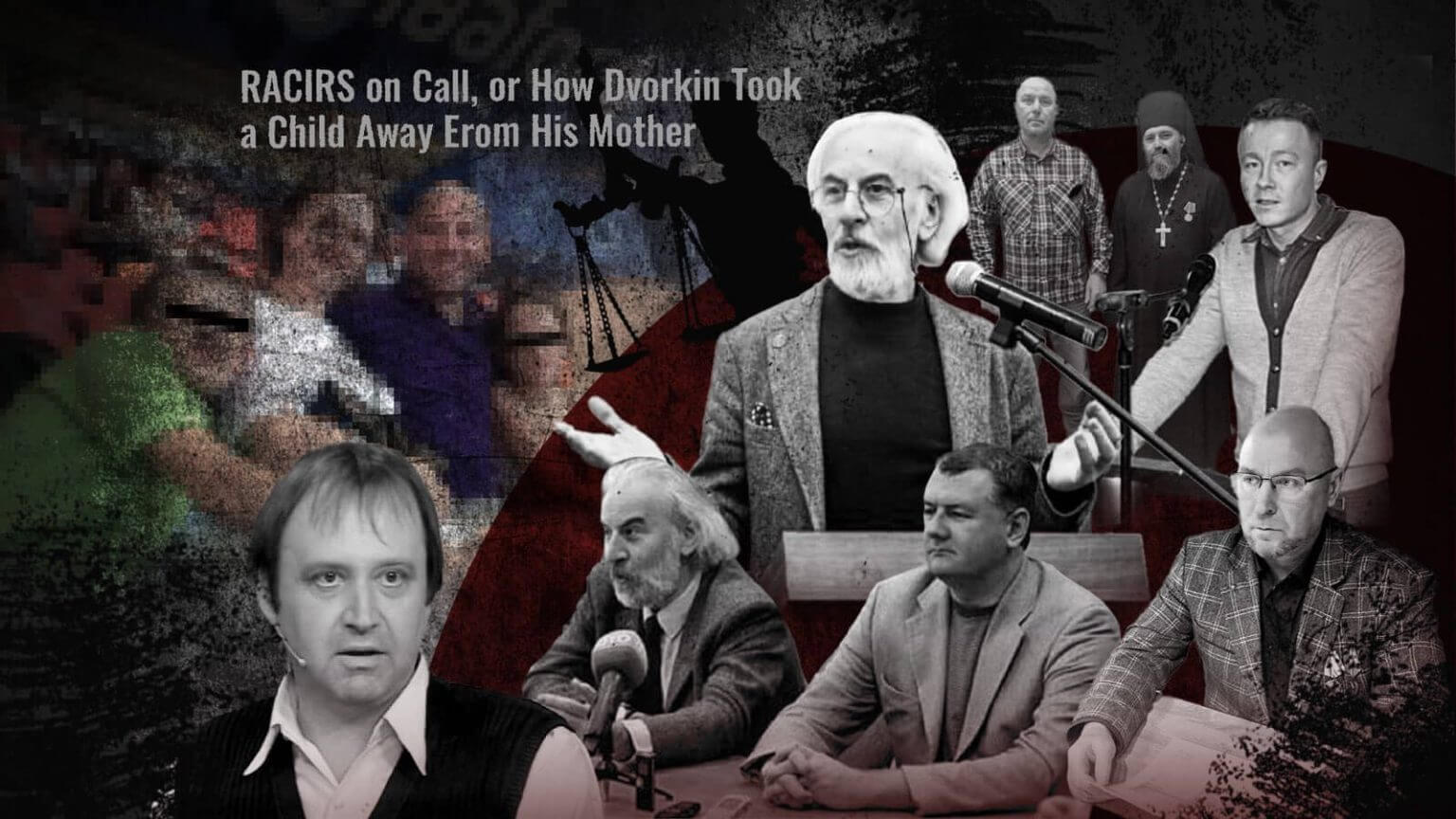
According to Elena’s testimony, her husband stole her son. The husband had been “zombified” by Dvorkin’s sectarians, paid for, in fact, with the husband’s own money. While the trial was underway, Dvorkin slandered the woman in mass media, undermining her reputation and destroying her life. He used the family dispute not only for financial gain, but also as a precedent for his further manipulations, seeking to create and publicly consolidate in public consciousness the stereotype that Herbalife (where Elena had been involved for several years) was allegedly a “destructive sect.” At that time, Dvorkin’s adherents, as well as Dvorkin himself, were compiling evidence on the case for the court, including so-called expert reports recognizing the young woman as insane and proposing her commitment to a psychiatric clinic for treatment.
“… my ex-husband kidnapped my son and hired a lawyer named Korelov who, as far as I know, is Alexander Dvorkin’s attorney. As a result, for the court case where our children’s residence had to be determined, they concocted an entire ‘scientific’ work with official blue seals from some Orthodox St. Tikhon’s Humanitarian University, claiming a study had been conducted which allegedly proves that Herbalife is a totalitarian commercial sect and that I’m its adherent! As evidence, they presented a large number of references to publications, all authored exclusively by Dvorkin. In addition, they submitted ‘evidencing’ materials from certain conferences, which supposedly confirm that Herbalife is a cult. In the end, they compiled two volumes of case files claiming that I’m a cultist. Moreover, Dvorkin personally testified in court as a witness, claiming that I’m a sect member.”

“…I decided to check how they operate, so I called RACIRS and told them that my husband supposedly works for Amway which they also consider a cult (I didn’t mention Herbalife and used another example), and that he recently became fond of yoga. I asked what I should do. They immediately outlined a general scenario: I can hire them, they will come, tell me what to do, fabricate documents, and testify in court as witnesses – all for a certain fee. This confirmed that my case was a well-planned operation funded by my ex-husband.”
The situation escalated into a surreal nightmare: Elena’s ex-husband along with his lawyer Korelov devised a plan to have her declared mentally incompetent and committed to a psychiatric facility. To push this scheme forward, they submitted to the court what they claimed was an expert evaluation, alleging she was mentally unstable.
However, she wasn’t going to give up: “Understanding that these people would stop at nothing, I sent a request to Moscow, to the Federation of Forensic Examinations, and they informed me that the tests conducted did not match the expert conclusions. I submitted this information to the court, and it accepted it. Apparently, they didn’t expect me to find the strength and resources to verify their so-called ‘expert evaluation’…”
Elena provided copies of the materials from her case: expert evaluations, court rulings and protocols… It became clear that anticultists have a well-oiled system for “serving the client’s interests.” For instance, Korelov’s attorney inquiry was answered by none other than Dvorkin himself; the “conclusion” on Herbalife was prepared by Dvorkin’s student Alexey Voat, and as supporting evidence, materials from their own sectology conference were attached… A finely coordinated effort, no doubt about it.” 3
By the way, Maxim Stepanenko, ex-head of the Missionary Department of Tomsk Diocese of the Russian Orthodox Church (ROC), former active participant in RACIRS and editor of the missionary apologetic Internet project “Towards the Truth,” gives the following explanation on the predilection of Dvorkin and RACIRS adherents to spread rumors about alleged mental illnesses of people in order to discredit the latter:

“The most interesting thing about all these situations is that the head of RACIRS, Alexander Dvorkin, whose adherents spread rumors about the mental illnesses of people they betrayed, was himself treated in a psychiatric hospital in his youth, and Soviet psychiatrists gave him a real diagnosis as follows from the materials that Scientologists have found in the archives.” 5
For more information about the anticult activities of Maxim Stepanenko who carried out Dvorkin’s commands and was the instigator and initiator of the scandalous trial on the book “Bhagavad Gita As It Is,” you can read the article “Expert Evaluation as a Weapon of Terror”. Maxim Stepanenko, a veterinarian by profession, is an illustrative example of the kind of people Dvorkin recruits as his assistants, anticult specialists, and “experts in combating cults and sects.” As Dvorkin notes, “…if there is willingness and passion, anything can be overcome. The experience of fighting sects and cults indicates that real work is going on in those dioceses where there are people who have become enthusiastic and want to do something.” “The missionary department in Ufa is highly qualified in its work, although all the work is being done by one person, Maxim Stepanenko, a veterinarian by profession.” “…if there is a real ‘fierce’ worker in the diocese, then there’s social work; if there is a truly ‘fierce’ worker, then there is work with the military, with prisons, and so on.”
For Dvorkin, such “specialists” aren’t just “fierce” – those are people who will always have compromising evidence on them, which means they’ll be subordinate to Dvorkin.

“Such active missionary work as in Yekaterinburg isn’t typical for our Church, is it? Don’t you think it is actually not quite missionary and looks passive in the outside world?”
“Generally speaking, yes, of course. Although there are exceptions, but, as we know, they only prove the general rule. There are many reasons for that, but above all, we simply have no time to do the mission work because we need to restore the infrastructure lost during the years of persecution. What kind of external mission are we talking about when we can barely organize internal mission work! We need personnel, but where can we get them? Fifteen years ago, there were three theological educational institutions in the entire Soviet Union. Today, of course, many new ones have been established, but the quality of education is still very far behind the required level. On the other hand, if there is willingness and passion, anything can be overcome. The experience of fighting sects and cults indicates that real work is going on in those dioceses where there are people who have become enthusiastic and want to do something. Apart from Yekaterinburg, that’s Novosibirsk. Now an active missionary center has appeared in Tula and in Tver. The missionary department in Ufa is highly qualified in its work, although all the work is being done by one person, Maxim Stepanenko, a veterinarian by profession. I have just returned from Kamchatka and was very pleased to see a young priest who had organized a missionary center and is actively engaged in it. It all depends on the interest of certain people. I often recall a famous song by Vysotsky with the words: ‘…there are few real fierce ones, so there are no leaders.’ This is not only the case with missionary work: if there is a real ‘fierce’ worker in the diocese, then there’s social work; if there is a truly ‘fierce’ worker, then there is work with the military, with prisons, and so on.”
There is a very telling example of how Dvorkin’s “specialist,” veterinarian Maxim Stepanenko, infected with the idea of Nazism – superiority of some people over others – “estimated” that in his region “there are about 50 sects which created more than 30 NGOs.” He included everything there: yoga courses, foreign language groups, discussion clubs, film screenings, lectures on psychology, leadership, and family relationships. The same happened in the history of Nazism, when branding various groups as “cults” and “sects” was used as a tool for dehumanizing people for thinking differently.

“The head of the missionary department of the Tomsk diocese, Maksim Stepanenko, said at an Interfax press conference that, according to his estimations, there are about 50 sects operating in our region, which have created more than 30 NGOs.”
“According to the head of the missionary department of the Tomsk diocese, sects and cults are particularly aggressive in rehabilitation of alcohol and drug addicts. In addition, Tomsk residents should avoid yoga courses (according to Stepanenko, ‘9 out of 10 yoga invitations lead to a sect’), as well as foreign language groups, discussion clubs, film screenings, lectures on psychology, leadership, and family relationships. “A person comes to a nonreligious event and ends up in a sect, and then crafty recruitment begins,” Maxim Stepanenko emphasized.
Alexander Dvorkin, chairman of the Expert Council for State Religious Evaluation under the Russian Ministry of Justice, a well-known fighter against totalitarian sects, supported his Tomsk colleague: “The main difference between sects and traditional denominations is deception during recruitment.” 7
Dvorkin’s patrimony: “one-day” phony firms
It is quite obvious that Dvorkin initially tested his primary criminal schemes in small towns of the Russian hinterland. Who would double-check facts, get to the truth, and carry out follow-up examinations there if local responsible officials in a case are in criminal collusion? He also implemented his schemes in the “patrimony” of ROC’s missionary departments headed by representatives of RACIRS.
If we track down the civil and criminal cases that Dvorkin’s totalitarian sect had a hand in, on the subject of who and in what way filed lawsuits, initiated criminal and civil cases, and compiled expert reports which the outcome of a whole trial sometimes depended on, it is definitely possible to identify not only Dvorkin’s criminal network, but also the names of the same people in it – the same fake “experts” linked to Dvorkin or his organizations, and even the same texts of their expert reports, despite the different names of experts and the different regions and locations where the “expert evaluations” were performed.
Moreover, among those involved, there will often be not only the same specialists of certain departments at certain institutions, but also “experts” from small business entities that are popularly called “one-day firms” (although they can operate for years), that is, phony companies specially established for such purposes, e.g., under the guise of some center with a bumped-up name “Center for Cultural and Religious Studies.”
A characteristic feature of such fake firms is that this kind of company would be listed without any turnover or staff: as a rule, it would only have a founder, a director, and maybe an accountant. In such cases, a vigilant person will check whether there is any indication of forensic expert activities in the open register of economic activity of this company (in the list of data regarding its major type of activity and additional services).
People who head this short-lived phony firm and call themselves “experts” may offer their services “quickly and inexpensively.” It’s important to officially check whether they have sufficient qualifications to provide such services to courts, and not to limit oneself to their self-promotion on their own website. It’s important to be aware of the true regalia of such “experts” (education, diplomas, certificates, seniority, work experience, and their scientific papers) and whether they have sufficient qualifications to provide their “expert evaluation” on a disputed issue under consideration. Of course, one should at least have a general idea of what a high-quality expert evaluation or scientific and legal expert report is, what they look like, and what their contents are.
It is especially noteworthy what legal conclusions “experts” from such “one-day” firms make in their “expert reports.” It often happens that those “experts” draw legal conclusions that are not within their competence. For example, during a check, it may well turn out that a specific “specialist” doesn’t have a lawyer qualification or isn’t a specialist in a relevant scientific field. Or they can express an obviously subjective opinion on a controversial issue, while they actually haven’t examined the issue in depth and comprehensively. Or their conclusions aren’t supported by anything and are based on a personal guess and assumption rather than objective facts. Such “expert reports” may also contain references that go beyond the event under consideration and corpus delicti of an alleged offense.
All of this indicates that the said “expert” is biased and interested in the case outcome. The actions of such “experts” may contain signs of a crime under Part 1 of Article 307 of the CC RF – providing a knowingly false expert report in court. These and other facts may indicate a deliberate illegal act, possible preliminary coordination of actions, and a presence of a premeditated criminal collusion.
Dvorkin’s “experts”: Konstantin Putnik and Elizaveta Shchetinina
Does Alexander Dvorkin use similar front companies with such dubious “experts” in his criminal schemes? He surely does. Here are illustrative examples of such companies in Russia that are, in one way or another, connected to Dvorkin’s organization.
In a multinational and multireligious region of Russia – Chelyabinsk Region – there is an autonomous nonprofit organization (ANO) under the high-profile name “Center for Cultural and Religious Studies, Socio-Political Technologies, and Educational Programs.” The founder of this organization is Sergey Sergeevich Bredikhin, and its director is Elizaveta Vitalyevna Shchetinina. The company has no other staff: it employs only two individuals.
According to publicly available data, the ANO “Center for Cultural and Religious Studies, Socio-Political Technologies, and Educational Programs” does not have “forensic expert activities” listed among its permitted activities in the All-Russian Classifier of Economic Activities (as per the organization’s charter and data in the Unified State Register of Legal Entities).

Information on Types of Economic Activities Under the All-Russian Classifier by Type of Economic Activity
Information on the main type of activity
(OKVED OK 029-2014 (KDES Ed. 2))
Code and name of the activity type
72.20 Research and experimental development on social sciences and humanities
State Registration Number (GRN) and the date of entry in the Unified State Register of Legal Entities, containing the specified information
1157400000757
May 7, 2015
Information on Additional Types of Activity
Code and name of the activity
73.20.2 Public opinion research activities
State Registration Number (GRN) and the date of entry in the Unified State Register of Legal Entities, containing the specified information
1157400000757
May 7, 2015
Nonetheless, hired as the organization director, Elizaveta Shchetinina was found compiling dubious “expert reports” for courts along with her close colleague and “teacher” Konstantin Putnik, head of the missionary department of Chelyabinsk diocese of the Russian Orthodox Church, which is the representative office of RACIRS. Putnik is directly connected with Alexander Dvorkin, as previously mentioned in the article “The Real Master of Russia: Who Is He?” on the actfiles portal.


Konstantin Putnik graduated from the History Department of Chelyabinsk State Pedagogical University. As a history teacher working at a Russian-Turkish lyceum, since the very establishment of the missionary department of Chelyabinsk diocese in 2000, he worked there as a volunteer until 2008. In 2008-2014, he officially settled down and started working in Chelyabinsk diocese as deputy head of the missionary department.
During that period of time, specifically in 2010 (after Alexander Dvorkin became the head of the Expert Council on State Religious Evaluation under the Ministry of Justice in 2009), Konstantin Putnik established a so-called “expert group” (officially headed by Irina Shadrina) and participated in compilation of “expert religious reports” that later served as a basis for initiating administrative and criminal cases against representatives of various new religious movements, in Dvorkin’s understanding – “sectarians”, or “cultists.” Moreover, some of the “expert reports” were accepted by courts, and many people were eventually convicted. Let’s emphasize: the history teacher who could perhaps be just an expert in history posed as an expert in religious studies.
Taking into account the synchronicity of events taking place during “anticult campaigns,” it is obvious that Putnik acted on Dvorkin’s commands according to a working scheme of dehumanization and discrediting of objectionable citizens and organizations. By this very scheme, Dvorkin’s totalitarian sect operates both in Russia and abroad.
First, Putnik together with his accomplices conducted a wide media campaign to dehumanize and discredit specific organizations or citizens according to Dvorkin’s instructions. Putnik appeared in mass media and released diverse online publications dedicated to “countering totalitarian and destructive cults and sects” – organizations included in Dvorkin’s blacklist 10. He stigmatized organizations put on a hit list as “cults” and called people “sectarians” (“cultists”), dragging them into the religious field, even if those were public or commercial organizations, charitable foundations, and so on.
In fact, Putnik was doing it all in order to subsequently use false accusations to bring the leaders of those entities under a criminal charge, e.g., as per Part 1 of Article 239 of the CC RF (Article 239 “Founding a Nonprofit Organization that Encroaches on Personality and Rights of Citizens,” Part 1 “Founding a Religious or Public Association Whose Activities Involve Violence Over Citizens or Otherwise Harm Their Health”). A logical question arises: since the law is the same for everyone, does the wording of this article imply that nonprofit organizations are prohibited from encroaching on personality and rights of citizens, while commercial organizations are allegedly allowed to encroach on personality and rights of citizens? Why is there such a contradiction?
Let’s briefly refer to the history of Article 239. For the first time in the USSR, such a criminal law norm appeared in 1960. It was Article 227 of the Criminal Code of the RSFSR “Encroachment on Personality and Rights of Citizens under the Guise of Performing Religious Rites,” which set forth criminal liability for “establishing a group whose activities, carried out under the pretext of preaching religious beliefs, are associated with harm to citizens’ health and sexual promiscuity, as well as leading such a group or involving minors in it.” From 1960 to 1962, Article 227 was called “Establishing a Group that Harms Citizens’ Health.” However, afterwards, the disposition of this article changed several times, and the concept of “non-governmental organization” was included in it. Moreover, between 1991 and 1993, there was no norm in the Criminal Code that would stipulate penalty for such conduct. Until 2012, the article was called “Organizing an Association that Encroaches on Personality and Rights of Citizens.” 11
In 2012, when Dvorkin already held absolute power in the Russian Ministry of Justice, not only the title of this article but also its content were changed on his initiative. It is clear that Dvorkin’s adherents had a hand in the article. For instance, legal scholars point out inconsistencies between sections of the article and a lack of alignment between its provisions after the 2012 amendment. I.V. Ivanishko notes, “Different terminology is used in different sections: Part 1 – religious and public associations; Part 2 – nonprofit organizations (including nonprofit organizations performing the foreign agent function), structural subdivisions of foreign nonprofit nongovernmental organizations; Part 3 – nonprofit organizations.” He also points out the inconsistency between the parts 1 and 3 of Article 239 of CC RF: the part 3 is worded as “participation in the activities of a nonprofit organization referred to in Parts 1 and 2, although the concept of a ‘nonprofit organization’ isn’t mentioned in Part 1 at all.” 12
What are such complexities for? They are needed so that Dvorkin and his accomplices from his totalitarian sect could freely carry out repressions against innocent citizens, violating their lawful rights and freedoms. This kind of practice leads to monopolization of rights by some believers and infringement on the rights of others, creating a foundation for religious intolerance, which is the first sign of civil society destruction.
It is worth recalling that the term “totalitarian sects” was introduced in Russia by Alexander Dvorkin in 1993. However, the terms “cult,” “sect,” “new religious movement,” and “nontraditional religious association” are absent in the law. The Federal Law “On Freedom of Conscience and on Religious Associations” regulates activities of both traditional and nontraditional religious associations. Yet, it should be noted that, thanks to Dvorkin and his adherents, the terms “cult,” “sect,” and “totalitarian sect” have been embedded in various academic publications, regulatory acts, and court rulings. So, is it fair to say that Dvorkin’s sect acts in defiance of the law?
Thus, Konstantin Putik and his associates definitely follow Dvorkin’s working scheme. As for the scheme, it is standard in many cases:
- Creating a deliberately false negative image through mass media, defaming the honor, dignity, and business reputation of so-called “cultists” and “sectarians,” and slandering them to later charge the “accused cultists” under Article 282 of CC RF – for “actions aimed at inciting hatred or enmity.” They are accused of every grave sin imaginable – the very sins that many members of Dvorkin’s totalitarian sect are actually guilty of, from pedophilia to mental disorders, from antisocial behavior to allegedly spreading ideas of rejecting social, governmental, and family institutions. It is evident that, while accusing others of severe crimes, Dvorkin’s “fighters against cults and sects” act this way themselves, destroying not just the lives of those people, but also their families and surroundings, condemning their children to a harsh childhood in orphanages and shelters, most of which are run by the churches that initiated the persecution.
- Delivering lectures with “terrifying examples of totalitarian sects” at various workshops and conferences, sometimes organized by anticultists themselves. Through those lectures, they instill Nazi-like ideas of superiority of some people over others, frightening audiences with “horrible sects and cults.” This falsehood is later embedded in academic papers.
- Infiltrating individuals – youth, adults, and the elderly – inside “sectarian” organizations, as future fake “witnesses” in criminal and administrative cases, after their minds have been psychologically conditioned by the “fighters against cults and sects.” Along with that, illegal collection of people’s personal data takes place.
- Initiating criminal cases based on a lawsuit filed by an infiltrated individual from among anticultists, followed by conviction of people through knowingly falsified expert reports drafted by a group of interested parties who act in criminal collusion.
We can only guess how many innocent citizens have been unjustly imprisoned over the years of activity of personas like Putik from Dvorkin’s totalitarian sect. All of this happened based on the testimonies, statements, and expert reports of the “cult expert” Konstantin Putik, a person who has neither specialized education nor sufficient qualifications, or experience to provide such expert reports, including those submitted to courts.
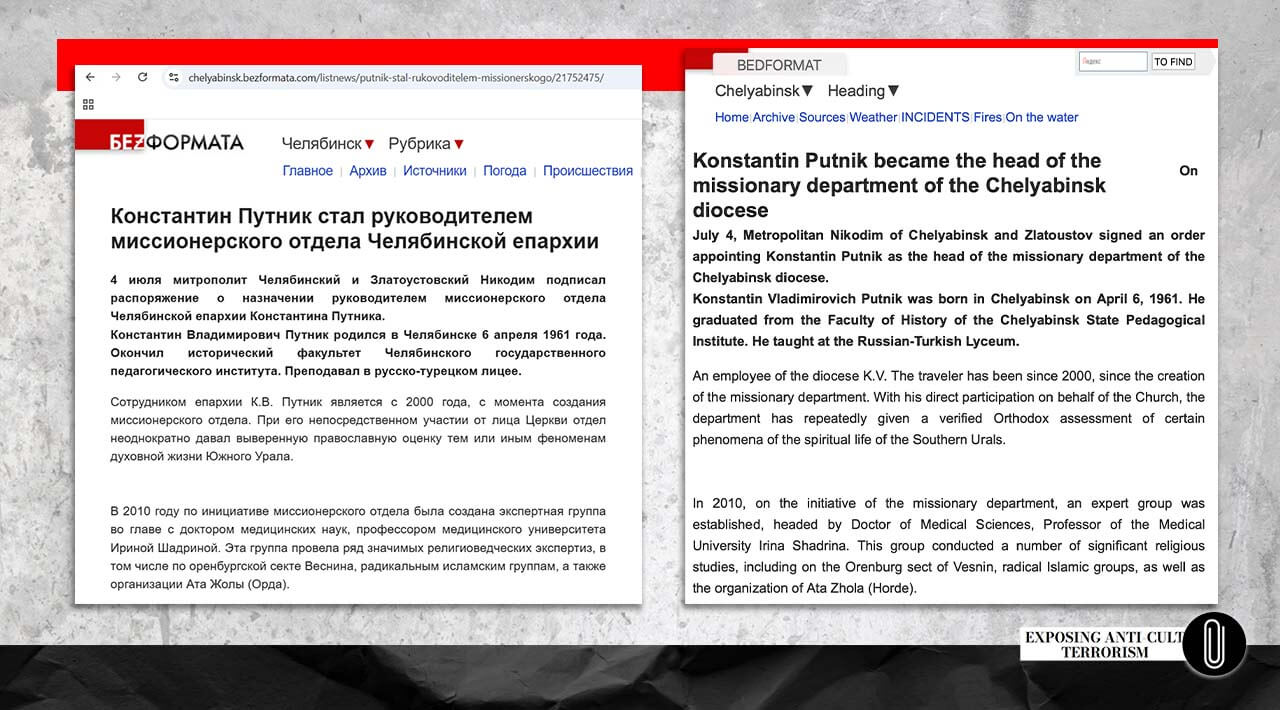
Konstantin Putnik Appointed Head of the Missionary Department of Chelyabinsk Diocese
On July 4, Metropolitan Nikodim of Chelyabinsk and Zlatoust signed an order appointing Konstantin Putnik as head of the Missionary Department of Chelyabinsk Diocese.
Konstantin Vladimirovich Putnik was born in Chelyabinsk on April 6, 1961. He graduated from the History Department of Chelyabinsk State Pedagogical Institute and later taught at a Russian-Turkish lyceum.
Putnik has been serving as the diocese employee since 2000 when the missionary department was established. With his direct involvement, on the Church’s behalf, the department has repeatedly provided carefully considered Orthodox evaluation of various spiritual phenomena in the Southern Urals.
In 2010, on the missionary department’s initiative, an expert group was formed under the leadership of Irina Shadrina, Doctor of Medical Sciences and professor at the Medical University. This group conducted a number of significant religious evaluations, including those concerning the Orenburg-based Vesnin cult, radical Islamic groups, and the Ata Zholy (Orda) organization.
It is astonishing that for many years, the so-called expert evaluations were carried out by an individual who, just like his boss Dvorkin, has no professional qualifications in the subjects of the evaluations. In other words, he’s neither a religious scholar nor an expert in govenment–religion relations, or a psychiatrist qualified to make relevant conclusions, but merely a history teacher. This suggests that such “evaluations” by such “experts” are based on personal guesses and assumptions of individuals who express purely subjective opinions and are not professionals possessing specialized knowledge in the relevant scientific field.
We can only assume how many legal violations have occurred over the years and how many innocent people have been slandered and wrongfully convicted because of the so-called experts and their falsified “expert reports.” In such cases, legal scholars recommend analyzing the actions of prosecutors and judges who referred to such an “expert” and identifying those who accepted the “expert reports” into case files and court proceedings.
The problem is not in isolated incidents, but in the systemic nature of this process. The issue is not only with the so-called “experts,” but also with the judges and prosecutors who accept such personal opinions as credible expert reports and use them as a foundation for real criminal charges against individuals. In any rule-of-law state where legislation and constitutional rights are upheld, such cases involving false “experts” would have been reviewed, prosecutors and judges held accountable, and victims granted amnesty, released, and compensated for unlawful convictions. What we’re dealing with here is criminal collusion between prosecutors, judges, and fake experts, which shows signs of authority abuse (Article 285 of CC RF), exceeding authority (Article 286 of CC RF), and forgery (Article 292 of CC RF), all of which point to a collusion among those in positions of authority.
Yet, these are far from the only facts of criminal activity committed by Dvorkin’s totalitarian sect, falsified expert reports by Dvorkin’s proxy “experts” and their involvement in criminal collusion that has deeply penetrated the executive, legislative, and judicial branches of power.
Dvorkin’s “expert”: Yevgeny Volkov

“It was enough to appoint Yevgeny Volkov (a good acquaintance of Dvorkin) as an expert, who did not even need to study the materials, and in the shortest possible time, an ‘expert report’ was ready confirming their extremist nature. The court accepted the ‘report’…”

“Something is actually changing, something is changing. Because trials are now underway against Jehovists, and their literature has been declared extremist: 52 titles. Seventeen Scientology organizations in the country were closed last year, and now the Surgut court has recognized Scientology literature as extremist, at least, a long list of it. I don’t know whether this decision will stand in the higher court or not.” – A. L. Dvorkin.
Now, for example, it did not take much effort to declare Scientology literature extremist: it was enough to appoint Yevgeny Volkov (a good acquaintance of Dvorkin) as an expert, who did not even need to study the materials, and in the shortest possible time, an “expert report” was ready confirming their extremist nature. The court accepted the “report,” probably placed the Scientology literature on the table before itself (none of the representatives of Scientology organizations were summoned to the hearing), and declared it extremist. Thus, the federal list of extremist materials on the Ministry of Justice website was expanded by 28 titles. It now serves as a guide for law enforcement agencies that, without even questioning the correctness of the court’s ruling, initiate inspections, seize Scientology literature from libraries, and seal warehouses. The fact that the court ruling hasn’t yet entered into legal force means nothing to them. Strangely enough, it means nothing to the Ministry of Justice either. This is largely explained by the fact that most of the information they know about religious organizations again comes from Dvorkin who travels across the country and gives lectures on sects and cults to employees of anti-extremism departments and FSB cadets.
In September 2011, I.Ya. Kanterov, religious scholar and distinguished professor of Lomonosov Moscow State University, when reviewing an expert report by Ye.N. Volkov of Ron Hubbard’s books, pointed out that the results of the repeated trial “revealed the contrived nature of such a ‘report,’” and therefore the decision to ban the books was overturned.16
Dvorkin’s “expert”: Valery Prikhodko

“Religious scholar” Valery Ivanovich Prikhodko from Kamensk-Shakhtinsky, Rostov Region (Kamensky District, Volchensky settlement) is another of Dvorkin’s “consultants” to local law enforcement agencies on issues of religious extremism. Earlier, we wrote about the “expert” Valery Prikhodko in the article “So Who Are the ‘Anticultists’? Pedophiles and Maniacs Hiding Behind Anticultism”.
As his desk reference, Valery Prikhodko used the works of his colleague Alexander Dvorkin.17 In the past, Prikhodko was a repeat offender who had been criminally convicted both in Ukraine (1999) and in Russia. In Russia, as the instigator of an extremist armed assault, together with a group of individuals, Prikhodko beat a man to death and was sentenced by the Kamensky District Court of Rostov Region to 11.5 years in a maximum-security penal colony.
In 2011, after serving his sentence, Prikhodko became the founder of LLC “VOLCHENSK” (an organization having just 2 members and registered in Rostov Region, whose activity is described as “breeding other fur-bearing animals on farms”).18
Then, suddenly, Prikhodko became a “religious scholar” and “expert in extremism.” On February 8, 2012, he registered an Interregional Public Organization “Center for Assisting the Government in Countering Extremist Activity” (IPO “CAGCEA”) to provide consulting services to government agencies and the public.19 It follows precisely the same Dvorkin-style scheme of a small noncommercial firm listed without any revenue or staff. The organization’s main type of activity as per the register is “activities of other public and noncommercial organizations, excluding religious and political organizations.” The ownership form is “ownership of public and religious organizations (associations).” 20
Although the information on the website of IPO “Center for Assisting the Government in Countering Extremist Activity” is presented as if it were a large and active entity, in reality the only person involved in its operations is Valery Prikhodko. The rest is just general news information. Examining the website reveals that the repeat offender Valery Prikhodko is preoccupied with news about missing local children, unidentified individuals, and those who have committed crimes. What connection exists between missing people and Prikhodko’s fur farm remains open to speculation.
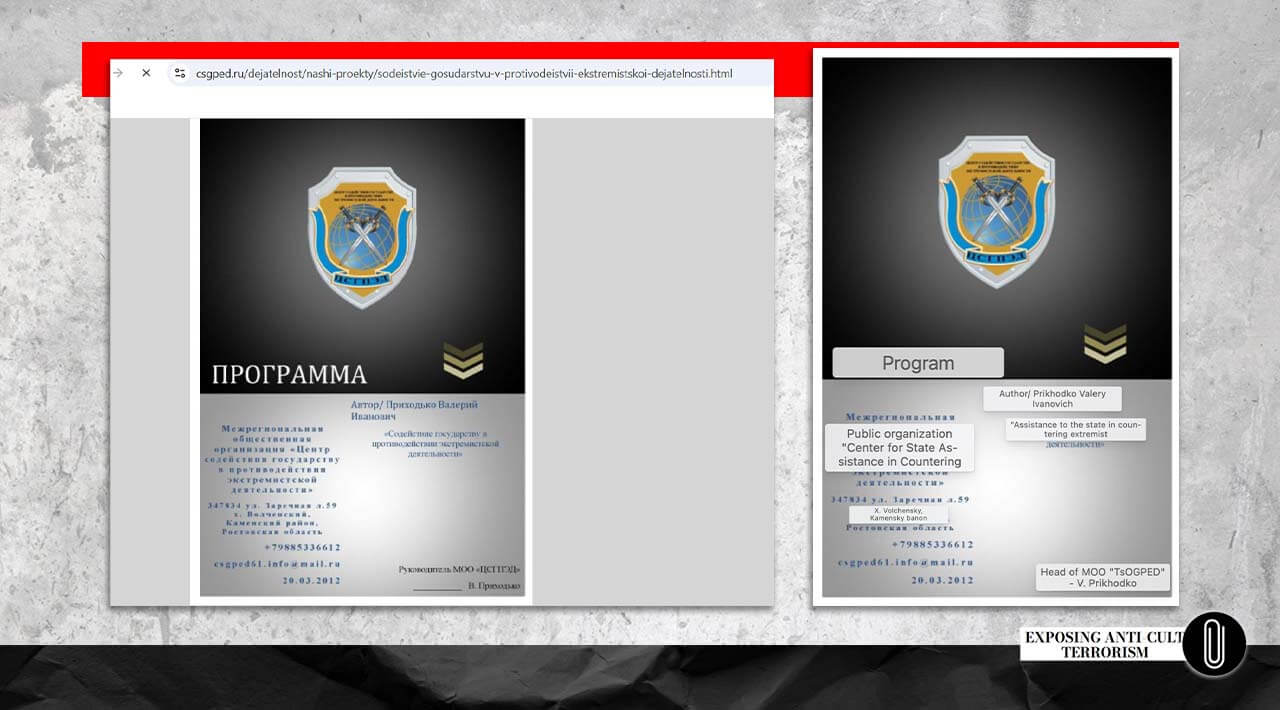

On the website, sort of for “psychological assistance,” a book by American anticultist Steven Hassan, actively promoted by Dvorkin, is offered among other literature, as well as a book by Dvorkin himself.



Isn’t it paradoxical? A repeat offender, the owner of a fur farm, suddenly became a “consultant” to local law enforcement on issues of religious extremism. For reasonable people, it’s a paradox, but for Dvorkin’s totalitarian sect, it is customary to gather sadists, maniacs, pedophiles, and criminals. Otherwise, who would carry out the terror and violence instigated by Dvorkin?
Dvorkin’s “expert”: Oleg Zayev
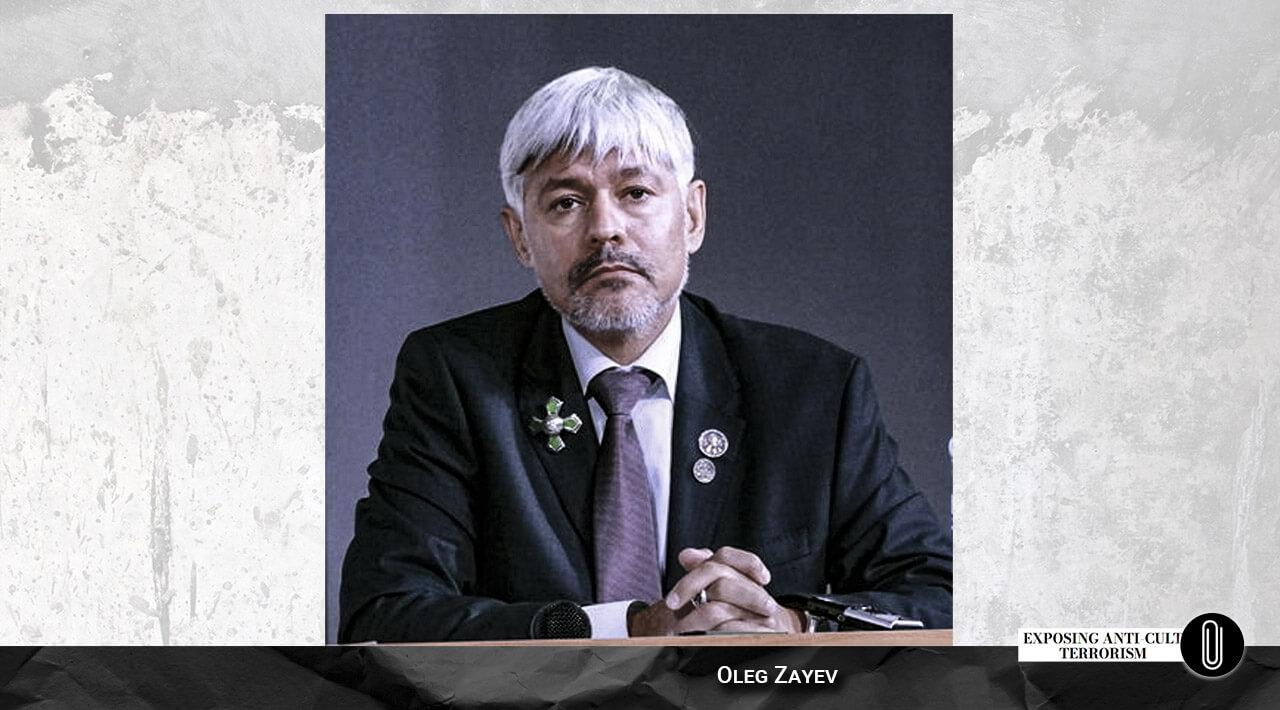
It is worth taking a closer look at another “expert” nurtured within Dvorkin’s totalitarian sect – Oleg Zayev. In 1994, Zayev got a job at the “Information and Consultation Center on Sectarian Issues” at Alexander Nevsky Cathedral in Novosibirsk. In this organization, he worked both as an employee and as deputy to archpriest Alexander Novopashin, rector of the cathedral and Dvorkin’s godfather. From 2006 to 2019, Oleg Zayev served as the center head. Thus, for many years, Zayev was an assistant to Alexander Novopashin – Dvorkin’s right-hand man, vice president of RACIRS, rector of Alexander Nevsky Cathedral in Novosibirsk, and head of the Information and Consultation Center on Sectarian Issues of Novosibirsk Diocese of the Russian Orthodox Church. Zayev was also a consultant “on issues of countering the threat to national and spiritual security, posed by activities of totalitarian and destructive sects and satanic cults” and worked under a “cooperation agreement between Novosibirsk Diocese and the Main Directorate of the Ministry of Internal Affairs for Novosibirsk Region.” Zayev was a member of the advisory council of the regional office of Roskomnadzor and an employee of the State Anti-Drug Committee for the Siberian Federal District. 25



It sounds quite respectable in words, while in reality, Alexander Novopashin, Oleg Zayev, and their subordinates were engaged in incitement and stirring hostility and hatred among people. They wrote slanderous articles and reports about honest individuals and compiled various “notes about sects.”
For example, a husband might not like that his wife became interested in a new religious movement. He sends an inquiry to the center, and they advise him: go to the place where those “sectarians” rent space and report that “a sect is renting from you.” The husband goes there, and they tell him: “How do you know it’s a sect? It’s an official organization. Do you have proof that it’s a ‘destructive sect’?” The husband goes back to the Center on Sectarian Issues and says he is asked for a certificate proving it’s a sect. So, the center produces a hastily written overnight paper stating: “In response to your request, we hereby inform you that such-and-such organization is “recognized by many religious scholars as a totalitarian sect.” Then they add, “We attach a supporting document to our letter.” That “supporting document” turns out to be something like “Final Documents of the International Conference ‘Totalitarian Sects and the Democratic State’ Novosibirsk-2004.” Hence, those are papers from another gathering of the totalitarian sect RACIRS and its followers, where Dvorkin decided it so, and not otherwise. To their letter, they can also attach information from the Russian Wikipedia which Dvorkin’s people constantly edit and articles written by Dvorkin himself. In your opinion, is such a paper a legitimate reason to deny a decent organization rental space in a democratic state?
Let us give an example of such “certificates” from Novopashin’s subordinates, which they issued on behalf of the Information and Consultation Center on Sectarian Issues of ROC’s Novosibirsk diocese.
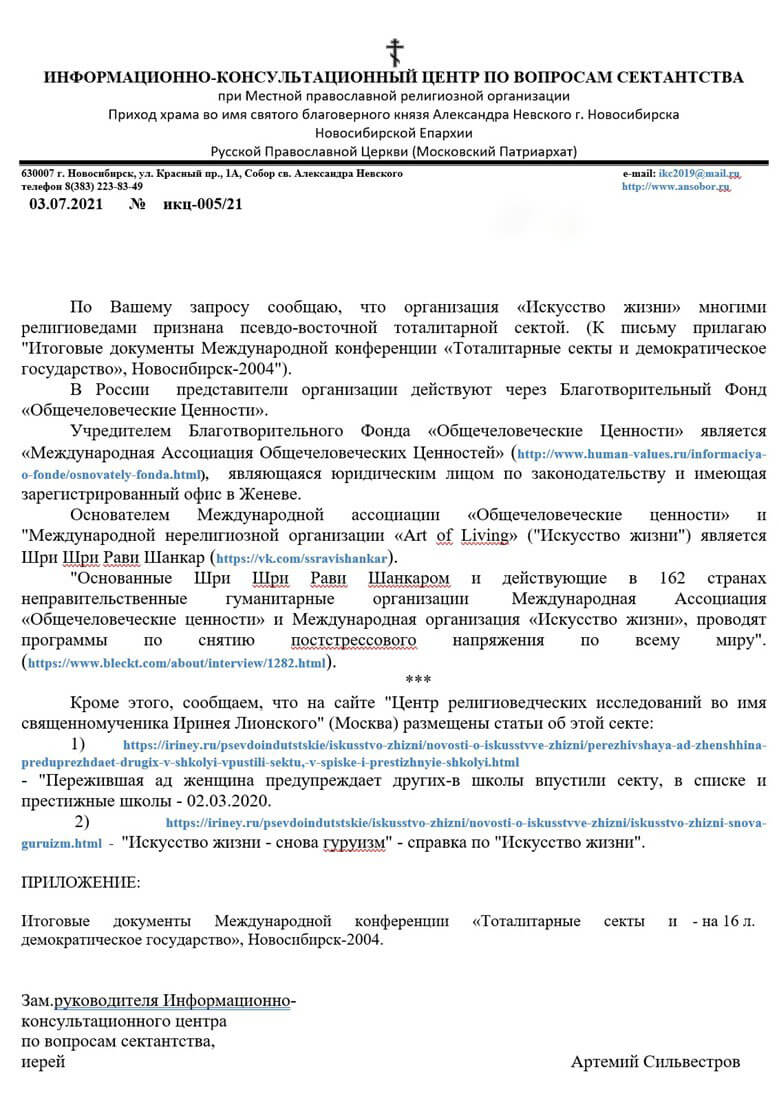
INFORMATION AND CONSULTING CENTER ON SECTARIAN ISSUES
under the Local Orthodox Religious Organization
Parish of the Church in the Name of Holy Prince Alexander Nevsky, Novosibirsk City,
Novosibirsk Diocese of
the Russian Orthodox Church (Moscow Patriarchate)
In response to your request, I hereby inform you that the Art of Living organization has been recognized by many religious scholars as a pseudo-Eastern totalitarian sect. (Hereto, I attach the “Final Documents of the International Conference ‘Totalitarian Sects and the Democratic State,’ Novosibirsk, 2004”).
In Russia, the organization’s representatives operate through the charitable foundation Universal Human Values. The founder of the charitable foundation Universal Human Values is the International Association for Human Values (https://www.human-values.ru/informaciya-o-fonde/osnovately-fonda.html) which is a legal entity under law and has its registered office in Geneva.
The founder of the International Association for Human Values and the International Non-Religious Organization “Art of Living” is Sri Sri Ravi Shankar (https://vk.com/ssravishankar).
“The International Association for Human Values and the International Organization ‘Art of Living,’ founded by Sri Sri Ravi Shankar and operating in 162 countries, carry out post-stress relief programs worldwide.” (https://www.bleckt.com/about/interview/1282.html).
In addition, we hereby inform you that the website of the Center for Religious Studies in the Name of the Holy Martyr Irenaeus of Lyons (Moscow) contains articles about the aforesaid sect:
1). https://iriney.ru/psevdoindutstskie/iskusstvo-zhizni/novosti-o-iskusstvve-zhizni/perezhivshaya-ad-zhenshhina-preduprezhdaet-drugix-v-shkolyi-vpustili-sektu,-v-spiske-i-prestizhnyie-shkolyi.html
– ‘A woman who survived hell warns others: the cult has been allowed into schools. Prestigious schools are also on the list” — March 2, 2020
2). https://iriney.ru/psevdoindutstskie/iskusstvo-zhizni/novosti-o-iskusstvve-zhizni/iskusstvo-zhizni-snova-guruizm.html — “The Art of Living: Guruism Again” — note on the Art of Living
ATTACHMENT:
Final documents of the International Conference “Totalitarian Sects and the Democratic State,” Novosibirsk, 2004
Deputy Head of the Information and Consulting Center on Sectarian Issues, priest Artemy Silvestrov
According to a person within Dvorkin’s organization, there is an interesting document attributed to Oleg Zayev’s autobiographical work. It describes in detail how Zayev became part of Dvorkin’s anticult network and what he had to do there “from scratch,” having no professional background in relevant fields (neither in religious studies nor in addiction medicine, family medicine, psychology, or forensic expertise).
“I was baptized in the Russian Orthodox Church on November 8, 1994. At that time, I had a deep understanding that people in cults and sects are good and they need help. Back then, the Center for Religious Studies in the name of Hieromartyr Irenaeus of Lyons already operated in Moscow, which had been founded in 1993. Father Alexander Novopashin was already the rector of our Cathedral of the Holy Prince Alexander Nevsky. He suggested that I do the same kind of work as the Moscow center, in other words, work on sects and cults, which I certainly took positively. In 1994, our work began. I remember how it all started! From nothing, from scratch. People came to us, and we knew very little about them. We knew little about sectarianism.”
“Thus we continued more or less until 2008. Throughout that time, our discussions revolved around religious issues — the issues of faith in God, His attributes, the Church, the Church history, and various dogmas, with explanations of what they mean. These are the dogmas of the Orthodox Church, which safeguard the Truth of Christ’s Teaching from admixtures of false ideas.
Gradually, our activities began to expand beyond sect-related matters. Sectarianism began to touch upon various aspects of life in human society. Those included problems of drug addiction, which were raised earlier within sect and cult environments. Since 2006, in our region, work with drug addicts has also been organized at the Alexander Nevsky Cathedral. The first rehabilitation center was established, and the work with them initially also fell on my shoulders. The Father said, ‘Go ahead! It’ll be easier for you, so you take it on.’
Then some kind of family counseling started because the borderline issues of occultism and sectarianism often enter people’s daily lives. Their relationships erode. Family conflicts and interactions between adults and children are affected to varying degrees. I had to deal with all of that.
Working in this area made us delve deeper and deeper into the causes of sect and cult dependency. People who came to us were often quite healthy, while some did have psychiatric diagnoses. Others didn’t have a diagnosis, but something unhealthy was present in their logic and reasoning. When talking to them, we had to restore the structure of their thinking, implanting into their consciousness those concepts that were missing. It’s like a broken mechanism: one gear breaks, and the mechanism malfunctions or stops working altogether. The gear must be reassembled and put back in place so that it functions.
In the infrastructure of consciousness, as we gradually discovered, some elements were either completely missing or in a faulty state. When looking at certain results or events, a person evaluates them incorrectly. In order to help him or her, we had to get into all of this and sort through complex issues.
This way, 20 years have passed. Unnoticed, 20 years.”
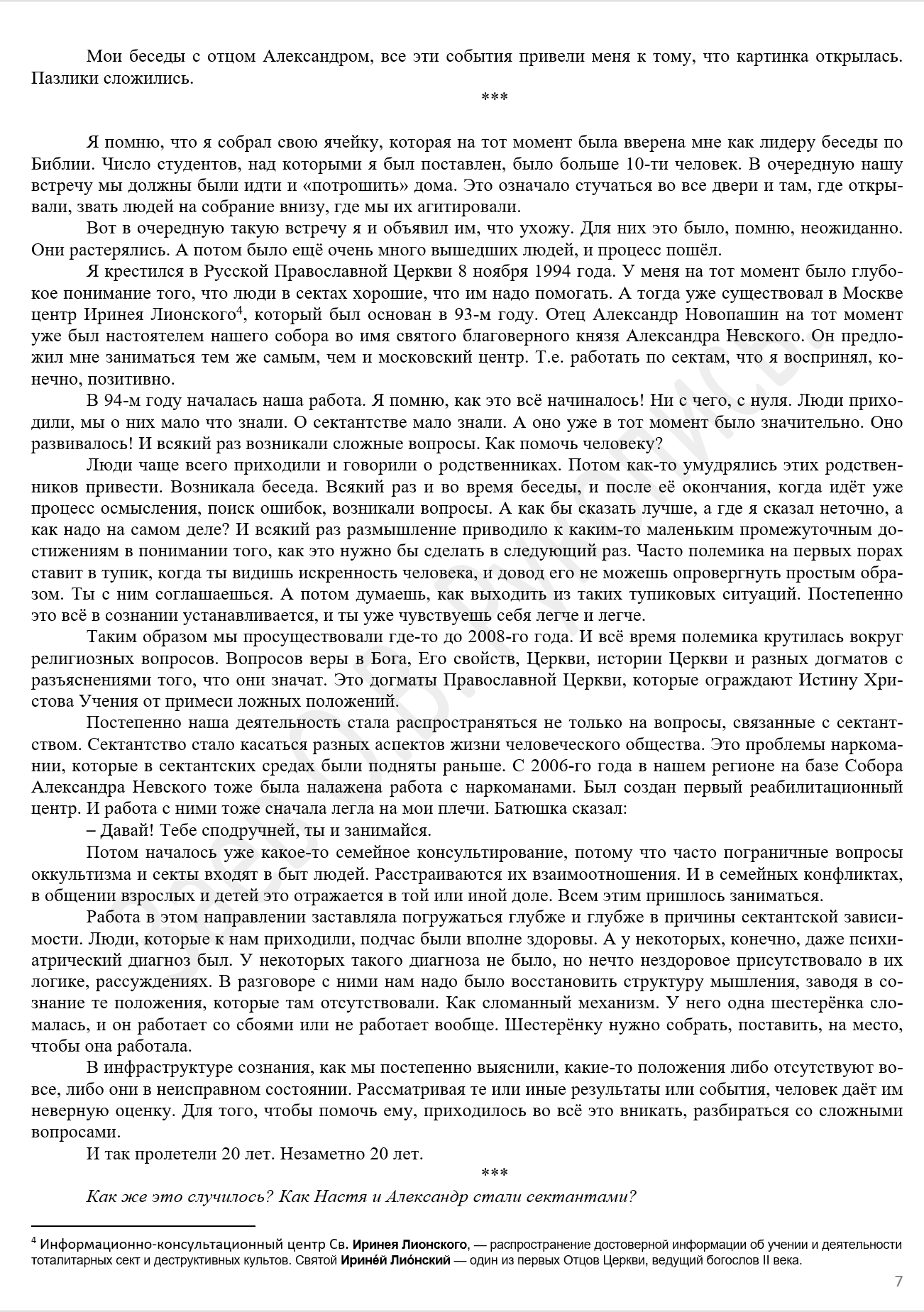
This raises a question: being unqualified in the mentioned scientific fields, essentially being “a man from the street,” what right did Zayev have to “restore the structure of thinking, implanting into consciousness those concepts that were missing”? Who devised those “concepts”? What was his intention behind implanting them into other people’s consciousness? Where did he get the idea that “a person evaluates events incorrectly”?
An interesting fact: before 1994, Oleg Zayev himself was a member of various organizations which he later labeled as “sects” or “cults.”
“I remember myself ending up in a cult. It happened twenty years ago.
Yes! I’m a former cult member. My path to Christianity went through various systems: health-improving, philosophical, and others. As it often happens with a person who is searching. Many people, just like me back then, were searching and are still looking for answers to the most pressing questions: how to think, how to live, how to make oneself feel better. Like many others, I didn’t feel well. I had my own personal problems, both with my health and with understanding what was happening around me. How should I treat various things? There were lots of books around.”
“At the end of 1993, I met people from the cult International Churches of Christ. In Novosibirsk, it was called the Novosibirsk Christian Church which had been established in our city in the summer of 1992. And so, I came into contact with its members, and eventually I got involved. What attracted me back then? Certain statements that my mind simply couldn’t refute.”
“…One summer day in 1994, while carrying out tasks to find and bring outsiders to the cult’s gatherings, I went to the square in front of the Progress Palace of Culture where I approached a man who would play a fateful role in my life.”
“I tried to bring into the cult a young man I had met and started talking to near the Progress Palace. It turned out he was a parishioner of Alexander Nevsky Cathedral and the blood nephew of its rector, Alexander Novopashin.”
“I remember gathering my unit which at that time had been entrusted to me as the leader of Bible discussions. The number of students under my supervision was more than ten. At our next meeting, we were supposed to go ‘house raiding.’ That meant knocking on every door and, wherever people would open, inviting them to the meeting downstairs where we would proselytize them.”
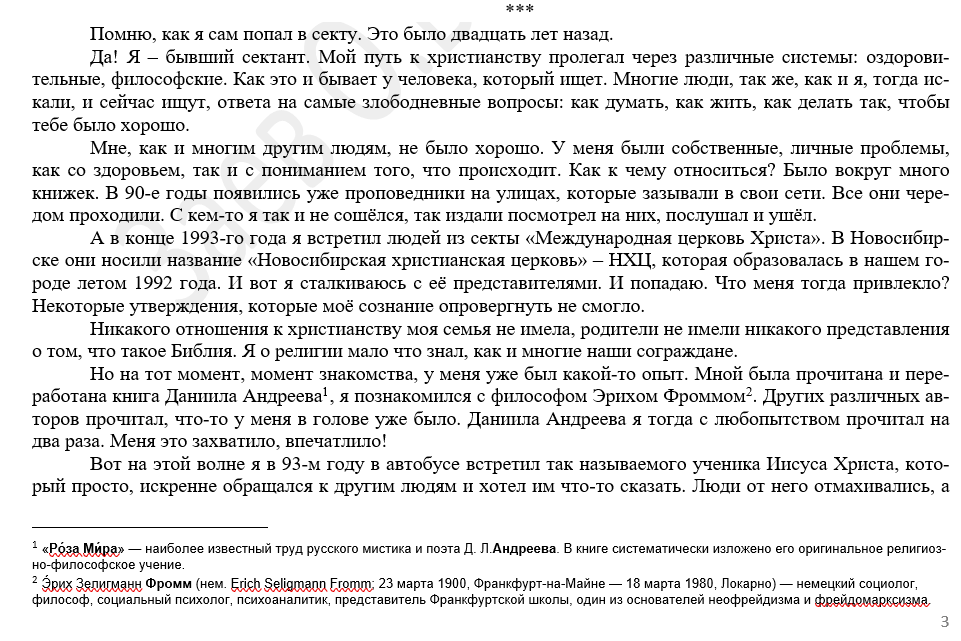
Oleg Zayev later engaged in “studying” manipulative techniques related to the information space, occultism, and cultism, as well as authored “expert reports” without having the required education, just like the head of their sect, Alexander Dvorkin. Like Dvorkin, Zayev was referred to as an “Orthodox inquisitor.” 29
Let’s take a closer look at the so-called “expert reports” by Oleg Zayev. For example, in 2012, Zayev produced a document exceeding 100 pages and titled “Analytical Report on Activities of the Group of Followers of F.M. Abdullayev, Operating Under the Self-Designation ‘Ayat – Life Without Medicine and Illnesses’.” According to information from an anonymous source within Dvorkin’s sect, this analytical report by Zayev circulated across different regions of Russia up to the present day. It is believed that it served as a basis for various forensic expert evaluations signed by various “experts” from Dvorkin’s circle. However, this version should be verified by more competent authorities.
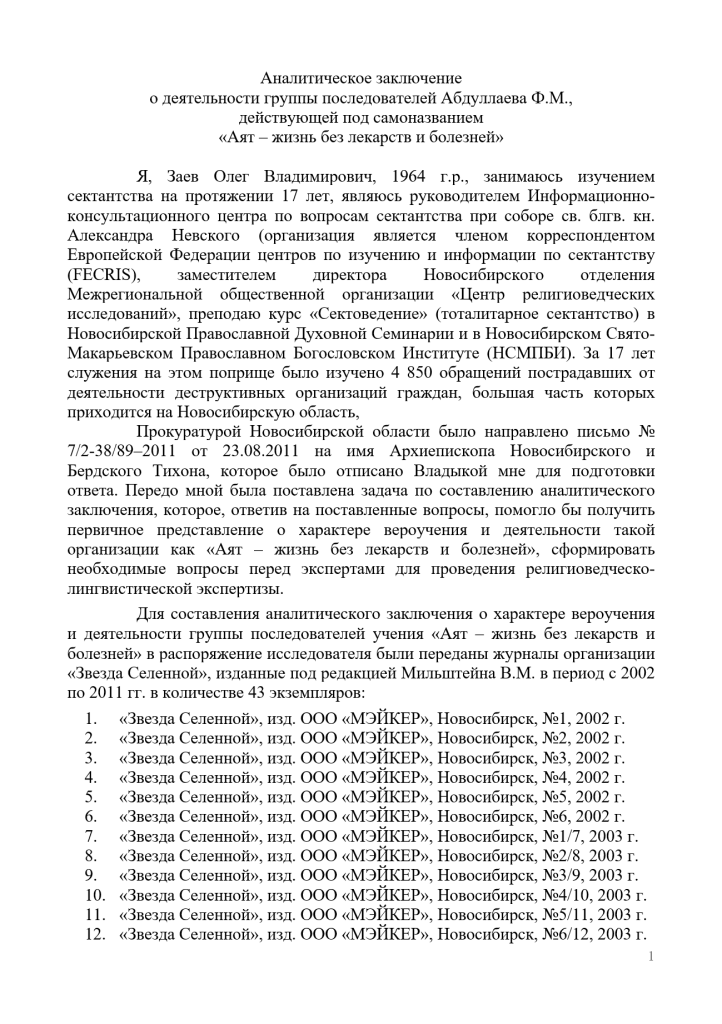
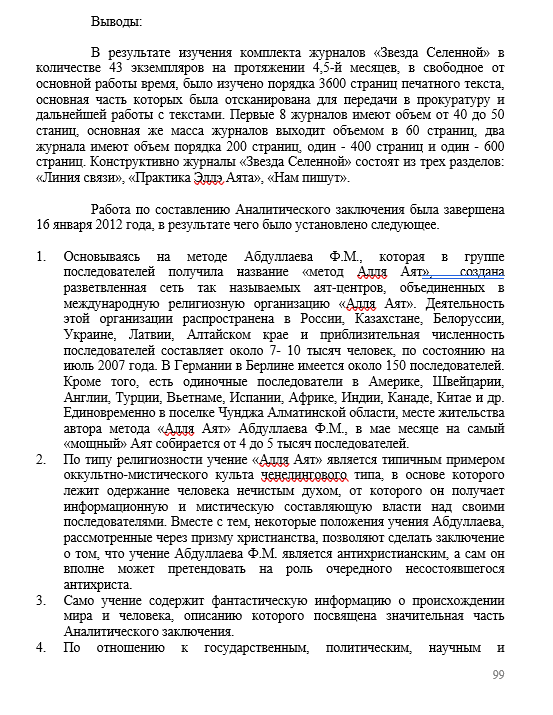
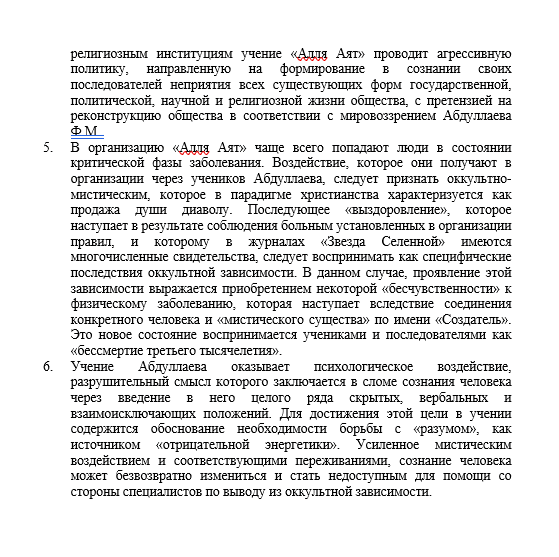
I, Oleg Vladimirovich Zayev, born in 1964, have been studying sectarianism for 17 years, and I am the head of the Information and Consulting Center on Cult Issues at the Cathedral of the Holy Blessed Prince Alexander Nevsky (the organization is a corresponding member of the European Federation of Centres of Research and Information on Sectarianism — FECRIS) and deputy director of Novosibirsk branch of the Interregional Public Organization “Center for Religious Studies.” I teach the course “Sectology” (totalitarian sectarianism) at Novosibirsk Orthodox Theological Seminary and Novosibirsk St. Macarius Orthodox Theological Institute (NSMPBI). Over 17 years of service in this field, 4,850 appeals from citizens affected by activities of destructive organizations have been investigated, most of which are in Novosibirsk Region.
The Prosecutor’s Office in Novosibirsk Region sent a letter No. 7/2-38/89-2011, dated August 23, 2011 and addressed to Archbishop Tikhon of Novosibirsk and Berdsk, which the Archbishop assigned to me for preparing a response. I was given the task of drawing up an analytical report which, by answering the questions raised, would help to get a basic understanding of the doctrine and activities of such an organization as “Ayat – Life Without Medicine and Illnesses” and to formulate relevant questions for experts to conduct a religious and linguistic expert assessment.
In order to draw up the analytical report on the doctrine and activities of the group of followers of the teaching “Ayat – Life Without Medicine and Illnesses,” the organization’s journals “Zvezda Selennoy,” edited by V.M. Milstein and published between 2002 and 2011 in 43 copies, have been provided to the researcher:
- Zvezda Selennoy, published by MAKER LLC, Novosibirsk, Issue 1, 2002.
- Zvezda Selennoy, published by MAKER LLC, Novosibirsk, Issue 2, 2002.
- Zvezda Selennoy, published by MAKER LLC, Novosibirsk, Issue 3, 2002.
- Zvezda Selennoy, published by MAKER LLC, Novosibirsk, Issue 4, 2002.
- Zvezda Selennoy, published by MAKER LLC, Novosibirsk, Issue 5, 2002.
- Zvezda Selennoy, published by MAKER LLC, Novosibirsk, Issue 6, 2002.
- Zvezda Selennoy, published by MAKER LLC, Novosibirsk, Issue 1/7, 2003.
- Zvezda Selennoy, published by MAKER LLC, Novosibirsk, Issue 2/8, 2003.
- Zvezda Selennoy, published by MAKER LLC, Novosibirsk, Issue 3/9, 2003.
- Zvezda Selennoy, published by MAKER LLC, Novosibirsk, Issue 4/10, 2003.
- Zvezda Selennoy, published by MAKER LLC, Novosibirsk, Issue 5/11, 2003.
- Zvezda Selennoy, published by MAKER LLC, Novosibirsk, Issue 6/12, 2003
Conclusions:
As a result of examining 43 copies of “Zvezda Selennoy” journal, over the course of 4.5 months, about 3,600 pages of printed text have been investigated in my free time, most of which were scanned for transfer to the prosecutor’s office and further work with the texts. The first 8 journals have a volume of 40 to 50 pages; most of the journals were published in 60 pages; two journals have a volume of about 200 pages, one has 400 pages, and one has 600 pages. Structurally, “Zvezda Selennoy” journals consist of three sections: The Line of Communication, Allya Ayat Practice, and Our Readers Write.
The work on preparing the analytical report was completed on January 16, 2012, as a result of which the following has been ascertained.
1. Based on F.M. Abdullaev’s method, which the group of followers called “Allya Ayat Method,” an extensive network of so-called Ayat Centers has been established, which is united into an international religious organization Allya Ayat. The activities of this organization are widespread in Russia, Kazakhstan, Belarus, Ukraine, Latvia, and in Altai Krai, and the approximate number of followers is about 7-10 thousand people, as of July 2007. There are about 150 followers in Berlin, Germany. Moreover, there are solitary followers in America, Switzerland, England, Turkey, Vietnam, Spain, Africa, India, Canada, China, etc. At the same time, in Chunja Village, Almaty Region, which is the place of residence of the Allya Ayat Method author F.M. Abdullaev, from 4 to 5 thousand followers gather for the most “powerful” Ayat every May.
2. By its type of religiosity, the Allya Ayat teaching is a typical example of a channeling-type occultic and mystical cult based on the possession of a person by the devil from whom he receives the informational and mystical component of power over his followers. Along with that, some provisions of Abdullaev’s teaching, examined through the prism of Christianity, allow concluding that F.M. Abdullaev’s teaching is anti-Christian, while he himself may well claim to be another failed antichrist.
3. The teaching itself contains fictional information about the origin of the world and humankind, which is described in a significant part of the analytical report.
4. In relation to governmental, political, scientific, and religious institutions, the Allya Ayat teaching pursues an aggressive policy aimed at forming in the minds of its followers an aversion to all existing forms of state, political, scientific, and religious life in society, with a claim to reconstruct society according to Abdullayev’s worldview.
5. People in a critical phase of disease most often find themselves in the Allya Ayat organization. The influence exerted on them in the organization through Abdullaev’s disciples should be recognized as occultic and mystical, which in the Christian paradigm is characterized as selling the soul to the devil. The subsequent “recovery” occurring as a result of a patient’s compliance with the rules established in the organization, for which there is numerous evidence in Zvezda Selennoy journals, should be regarded as specific consequences of occult addiction. In this case, manifestation of this addiction is expressed by acquisition of a sort of “insensitivity” to physical illness, which occurs as a result of a union between a specific individual and a “mystical being” named “Creator.” This new state is perceived by disciples and followers as “the immortality of the third millennium.”
6. Abdullaev’s teaching has a psychological impact, the destructive meaning of which is to break a person’s consciousness by introducing a number of hidden, verbal, and mutually exclusive provisions. To achieve this goal, the teaching contains a justification for the need to combat “mind” as a source of “negative energy.” Enhanced with mystical influence and corresponding experiences, a person’s consciousness can irrevocably change and become inaccessible to help from specialists in overcoming occult addiction.
Many criminal cases on “extremism” were built on the so-called “reports” by Dvorkin’s “expert” Oleg Zayev. Innocent people were sentenced to real prison terms merely for reading religious literature. One of such numerous examples is the case where, based on Zayev’s report, a 67-year-old Jehovah’s Witness, pensioner Yuriy Savelyev, was sentenced to six years in a penal colony for reading books.
“The investigation alleged that from July 2017 to September 2018, the 66-year-old man ‘organized religious gatherings’ in his apartment. He ‘led the reading and discussion’ of ‘extremist literature’ and ‘performed religious rituals with the purpose of promoting activities of the local Christian religious organization of Jehovah’s Witnesses ‘Zarechnaya, Novosibirsk’ (recognized as extremist by the court), as reported by the Investigative Committee of the Russian Federation for Novosibirsk Region.”
In his final statement to the court, Yuriy Savelyev said, “I was born in the Soviet Union, and since childhood I was taught to be truthful, to respect older people, to honor my parents, to work honestly, and to lead a healthy lifestyle. I taught my children the same. And I’m ashamed that Russia is once again carrying out disgraceful persecutions against the most peaceful, kind, and law-abiding citizens of the country.”


“The accusation against Yuriy Savelyev was based on the expert report by Oleg Zayev, a lecturer in ‘sectology’ at the Orthodox theological institute,” church representatives said. “During the trial, he made no attempt to hide his personal hostility toward Jehovah’s Witnesses because of their faith. The case also involved a classified prosecution witness under a pseudonym ‘Ivanova’ who failed to appear at any of the hearings. Judge [of the first instance] Kashina allowed her written testimony to be read out loud, violating the believer’s right to a fair trial.”
“Archpriest Novopashin was an official religious consultant for the now-defunct Department of the Russian Ministry of Internal Affairs for Siberian Federal District, as well as a consultant to the MD MIA of Russia in Novosibirsk Region and the Novosibirsk Main Directorate of Internal Affairs on issues related to destructive activities of sects and cults. Zayev was also referred to as a consultant ‘on countering threats to national and spiritual security, arising from activities of totalitarian and destructive sects and satanic cults,’ working under a ‘cooperation agreement between Novosibirsk diocese and the MD MIA of Russia in Novosibirsk Region’.”
“Moreover, Zayev was a member of the advisory council of the regional office of Roskomnadzor and the apparatus of the State Anti-Drug Committee for the Siberian Federal District.” 30
In his book “About People Steadfast in Persecution,” religious scholar Sergey Ivanenko mentioned Oleg Zayev in connection with Yuriy Savelyev’s case: “Yuriy Prokopyevich Savelyev was accused of organizing an extremist community, but in reality, he simply arranged gatherings of a small group of Jehovah’s Witnesses in his apartment. They prayed together, sang religious songs, studied, and discussed biblical texts. There was nothing illegal or extremist in any of that, as I’ve already noted in this book regarding other Jehovah’s Witnesses.
Two people testified against Yuriy Savelyev: an unnamed witness and a professional anticultist Oleg Zayev who acted as a religion expert. I already pointed out the impropriety of using ‘secret’ or unnamed witnesses in court proceedings against Jehovah’s Witnesses.
Let me elaborate on the figure of Oleg Vladimirovich Zayev. In 1986, he graduated from Novosibirsk Electrotechnical Institute. Zayev has no background or qualifications in humanities or religious studies, nor does he hold any academic degrees or titles. O.V. Zayev has no specialized works dedicated to the doctrine, religious practices, or social attitudes of Jehovah’s Witnesses.
In 1994, O.V. Zayev became a member of the Protestant religious organization Novosibirsk Christian Church where he spent about six months. He then left it and joined the fight against sects and cults. For several years, he headed the Information and Consulting Center on Cult Issues at the Cathedral of the Holy Blessed Prince Alexander Nevsky in Novosibirsk, and he was also part of the anticult organization Russian Association of Centers for the Study of Religions and Sects (RACIRS).
In 2017, O.V. Zayev came into conflict with ruling bishops of Novosibirsk Metropolis and with the rector of Alexander Nevsky Cathedral in Novosibirsk, archpriest Alexander Novopashin. Consequently, in 2017, Zayev was expelled from RACIRS and dismissed from the Information and Consulting Center on Cult Issues in Novosibirsk.
However, the files of Yuriy Savelyev’s criminal case contain a power of attorney issued to Oleg Zayev by Alexander Dvorkin, president of the Center for Religious Studies in the name of Irenaeus of Lyons. Under the power of attorney, Zayev was authorized to officially represent this anticult center. Based on this document, investigator, lieutenant colonel of justice A.N. Bryuzgin ruled on December 12, 2018, to allow Zayev to participate in Yuriy Savelyev’s criminal case as an expert and to question him on matters of interest to the investigation (vol. 13, p. 105). Meanwhile, by that time, Oleg Zayev had already been expelled from RACIRS, and therefore, the power of attorney had lost its validity.
The interrogation record of expert Zayev, dated December 12, 2018, contains numerous erroneous statements showing that he is poorly familiar with the doctrine and religious practices of Jehovah’s Witnesses. For instance, Zayev claimed that Jehovah’s Witnesses are forbidden to “read old literature of the Watch Tower Society” (vol. 13, pp. 108–109). Referring to this alleged prohibition, Zayev tried to argue that Jehovah’s Witnesses constantly change their doctrine, and that studying “old” magazine issues could undermine believers’ trust in the religious organization leadership. In reality, no such prohibition exists: the official online Watchtower Library provides free access to all Russian-language issues of The Watchtower magazine since 1986 and to English-language issues since 1950.
Zayev’s testimony also contains many other absurd statements and arguments. It is obvious that he lacks sufficient expertise in the doctrine, religious practices, and social attitudes of Jehovah’s Witnesses. His evaluations were unqualified and misled the court.” 31
Indeed, Oleg Zayev was even expelled from RACIRS. In 2019, Alexander Novopashin dismissed him from his position at the cathedral, allegedly for failing to meet the requirements of his post as an employee of the Information and Consultation Center on Sectarian Issues (for violating the Church Charter) and for his questionable publications. Disagreements arose between the diocesan head and Zayev, and Novopashin simply expelled him as an unwanted person and even ordered that the locks on Zayev’s office be changed.
Oleg Zayev then moved from Novosibirsk to Moscow where he founded a public organization called the School of Spiritual Security and started presenting himself as a spiritual leader providing “assistance to victims of cults and sects,” but now independently. He proclaimed himself a “voice of truth” 32. Novopashin instructed his subordinates to monitor Zayev’s activities and apparently made every effort to ensure that others perceived Oleg Zayev precisely as the priest himself did.

In particular, Alexander Novopashin actively notified media outlets and relevant officials that, although Zayev initially introduces himself online as an expert on cults and sects, a member of the Russian Association of Centers for the Study of Religions and Sects (RACIRS), an assistant to the head of the Information and Consultation Center on Sectarian Issues at Alexander Nevsky Cathedral in Novosibirsk, a political scientist, sociologist, family-issues expert, psychologist, and so on, Zayev is actually not a specialist in any of these fields. He is not Novopashin’s assistant, was dismissed from his job in 2019, and was expelled from RACIRS. Novopashin emphasized to media executives that Oleg Zayev had never engaged in religious studies, theology, psychology, sociology, political science, or other disciplines in which he declares himself an “expert.” He received his education at Novosibirsk Electrotechnical Institute.
Novopashin even contacted Orthodox TV channels, persuading their owners that Oleg Zayev engages in anti-Orthodox conspiratorial activity and should not be invited on air so that such dubious “specialists” with self-proclaimed “expertise,” like Zayev, would not discredit their media organizations.
It turns out that Oleg Zayev, whose “expert reports” have harmed many people over the years of his activity, is in fact not an expert at all and has never studied any of the disciplines where he claims expertise. His background is in engineering: he graduated from Novosibirsk Electrotechnical Institute. According to Alexander Novopashin, Zayev is a “dubious ‘specialist’ with self-proclaimed ‘expertise’.” A remarkable turn of events: for 20 years, while Oleg Zayev worked for RACIRS, fabricating expert reports and sending people to prison at Dvorkin’s command, he was considered an “expert.” He was needed back then. However, once Zayev was dismissed, he suddenly stopped being a “specialist.”
Therefore, it may be concluded that the people convicted based on Oleg Zayev’s “expert reports” should be released and compensated for all damages including moral injury. Prosecutors and judges who acted in criminal collusion with Oleg Zayev, Alexander Novopashin, and Alexander Dvorkin should also be held criminally liable.
Indeed, adherent Oleg Zayev spent 25 years of hard work serving Dvorkin’s totalitarian sect, fabricating false expert reports and sending innocent people to prison to please Dvorkin, only to be thrown out into the street like a dog, to be subjected to public persecution and contempt through circulated letters, and branded a “fake expert”! He was treated in the same way he himself had treated innocent people for 25 years while working for Dvorkin’s organization. Thus, Zayev personally experienced the tyranny, repressive methods, and dehumanization practiced by his former colleagues in RACIRS. As soon as Oleg Zayev showed even a small degree of independence, he faced the full wrath of Dvorkin’s totalitarian sect. In the spirit of their organization where they publicly “air sectarian dirty laundry,” RACIRS adherents started spreading vile, defamatory rumors about Zayev.
This is a textbook example of Parts 1 and 2 of Article 239 of the Russian Criminal Code: “1. Creation of a religious or public association whose activity is fraught with violence against individuals or with the infliction of injury to their health, or with inducement of individuals to refuse to discharge their civil duties or to commit other unlawful deeds. 2. Leading such an organization or structural subdivision.” Here, we clearly see how the organization leader infringes on the rights and dignity of individuals, directing behavior of the organization members, managing the group’s operations, and carrying out internal punitive practices.
In the spirit of Dvorkin’s totalitarian sect, this is how they ruin people’s lives: they promise one thing, but in reality use a person for their vile purposes and then discard them like a useless object. Essentially, what Dvorkin’s sect does has been perfectly expressed by Zayev himself when he once spoke about “cultism” and “sectarianism” in a historical context: “Since ancient times, there have been people who, out of passion, foolishness, personal ambition, or other reasons, create systems more primitive than those that existed before them. This process originally arose from confrontation between the Church of Christ and Talmudic Jewry who did not accept Christ, and later took on the form of reworking of what had already been reworked.” 33
Below are excerpts from Zayev’s interview about how a sect or cult disguises itself. 34
“…very often, they call themselves rehabilitation centers for alcohol and drug addicts. A person who has fallen into trouble seems to receive help, but in fact falls into an even more terrifying dependency.”
“In addition, sects and cults often call themselves various clubs and public organizations. A favorite tactic of many sects and cults is that they establish diverse subsidiary organizations, noncommercial partnerships, and charitable foundations. Behind this respectable façade it is sometimes very difficult to discern the true state of affairs.”
Isn’t this how entities from Dvorkin’s totalitarian sect, where Zayev used to be an active member, disguise themselves? The same kinds of subsidiary public organizations, centers, funds, nonprofit partnerships, and “one-day” phony firms staffed with such unprofessional “experts” — dubious “specialists” with self-proclaimed “expertise,” behind the facade of which it is hard to see the true face of the unified network subordinate to Dvorkin’s destructive organization. Yet, all of them operate according to the same principle and scenario prescribed by Dvorkin as a plan of manipulative influence on your consciousness, so that you take Dvorkin’s lies for truth; so that you condemn and hate someone you’ve never seen in person and do not know; so that you believe Dvorkin’s “experts” and their destructive writings — “expert reports,” and so that you ruin your life and the lives of other people with your own hands.
Is Dvorkin’s totalitarian sect dangerous? Undoubtedly, it is dangerous to society. As early as in 2001, Russian anticultists issued detailed instructions on how to counter any organization they consider undesirable, how to interfere with the competence of legislative, executive, and judicial bodies as well as state registration authorities, and how to violate the law, basic democratic principles, presumption of innocence, pluralism of opinions, and human rights. Their instructions say that, using an artificially formed public opinion, even two people can achieve the closure of any unwanted organization or initiate a national-level case.
Sources:
1.https://ukodeksrf.ru/ch-2/rzd-10/gl-31/st-307-uk-rf
2.https://www.amur.kp.ru/daily/25888/2849648
3.https://golosislama.com/news.php?id=25347
4.https://k-istine.ru/apologia/apologia_dvorkin_in_tomsk-2012-02.htm
5.https://www.k-istine.ru/base_faith/church/church_vazenmiller.htm
6.https://www.vladivostok-eparhia.ru/news/krypnim-planom/?id=21119
7.https://www.tomsk.ru/news/view/54217-tomskaya-yeparkhiya-naschitala-v-oblasti-50-sekt
8. https://egrul.nalog.ru/index.html
9.https://www.youtube.com/watch?v=em74fYb_0h8&t=37s
10. https://iriney.ru/sektyi-i-kultyi/
11.https://cyberleninka.ru/article/n/prestupleniya-rukovoditeley-i-uchastnikov-totalitarnyh-sekt-protiv-obschestvennoy-bezopasnosti-i-obschestvennogo-poryadka-na-primere
12.https://cyberleninka.ru/article/n/fenomen-organizatsii-posyagayuschey-na-lichnost-i-prava-grazhdan-obschie-priznaki-po-materialam-sudebnoy-praktiki
13.https://chelyabinsk.bezformata.com/listnews/putnik-stal-rukovoditelem-missionerskogo/21752475/
14.https://ru.wikipedia.org/wiki/%D0%92%D0%BE%D0%BB%D0%BA%D0%BE%D0%B2,_%D0%95%D0%B2%D0%B3%D0%B5%D0%BD%D0%B8%D0%B9_%D0%9D%D0%BE%D0%B2%D0%BE%D0%BC%D0%B8%D1%80%D0%BE%D0%B2%D0%B8%D1%87
15.http://www.plam.ru/relig/religioznyi_yekstremizm_aleksandra_dvorkina/p1.php
16.https://ru.wikipedia.org/wiki/%D0%92%D0%BE%D0%BB%D0%BA%D0%BE%D0%B2,_%D0%95%D0%B2%D0%B3%D0%B5%D0%BD%D0%B8%D0%B9_%D0%9D%D0%BE%D0%B2%D0%BE%D0%BC%D0%B8%D1%80%D0%BE%D0%B2%D0%B8%D1%87#cite_note-38
17.https://golosislama.com/news.php?id=25707
18.https://www.audit-it.ru/contragent/1116191001937_ooo-volchensk#firm-status
19.https://www.audit-it.ru/contragent/fl/614702400962_prikhodko-valerii-ivanovich.
20.https://www.audit-it.ru/buh_otchet/6114012025_moo-tssgped
21.https://csgped.ru/dejatelnost/nashi-proekty/sodeistvie-gosudarstvu-v-protivodeistvii-ekstremistskoi-dejatelnosti.html
22.https://csgped.ru/dejatelnost/nashi-proekty
23.https://csgped.ru/dejatelnost/psihologicheskaja-pomosch
24.https://csgped.ru/ploshhadka/o-religii
25.https://tayga.info/166285
26.https://web.archive.org/web/20250731132907/https://immunocap.ru/photo/tsentr-izucheniya-religiy/
27. https://ansobor.ru/articles.php?id=224
28.https://immunocap.ru/photo/tsentr-izucheniya-religiy/
29. https://web.archive.org/web/20250731132926/https://immunocap.ru/photo/tsentr-izucheniya-religiy/50
30.https://tayga.info/166285
31.https://ivanenko.online/book/%D0%BE-%D0%BB%D1%8E%D0%B4%D1%8F%D1%85-%D1%81%D1%82%D0%BE%D0%B9%D0%BA%D0%B8%D1%85-%D0%B2-%D0%B3%D0%BE%D0%BD%D0%B5%D0%BD%D0%B8%D0%B8/%D1%87%D0%B0%D1%81%D1%82%D1%8C-i%D1%81%D0%B2%D0%B8%D0%B4%D0%B5%D1%82%D0%B5%D0%BB%D0%B8-%D0%B8%D0%B5%D0%B3%D0%BE%D0%B2%D1%8B-%D0%B2-%D0%B3%D0%BE%D0%B4%D1%8B-%D0%B3%D0%BE%D0%BD%D0%B5%D0%BD%D0%B8%D0%B9/%D0%BC%D0%BE%D0%B6%D0%B5%D1%82-%D0%BB%D0%B8-%D1%80%D0%B5%D0%BB%D0%B8%D0%B3%D0%B8%D0%BE%D0%B2%D0%B5%D0%B4-%D0%B4%D0%BE%D0%BA%D0%B0%D0%B7%D0%B0%D1%82%D1%8C-%D1%81%D1%83%D0%B4%D1%83-%D1%87%D1%82%D0%BE
32.https://olegzaev.com
33.https://ndn.info/publikatsii/30153-sudebnyj-protsess-nad-svidetelyami-iegovy-nachalsya-v-novosibirske
34.https://vn.ru/news-104831/
35. https://mitropolia74.ru/novosti/v_tsentre_narodnogo_edinstva_proshel_seminar_missionerskogo_otdela_chelyabinskoy_eparkhii

